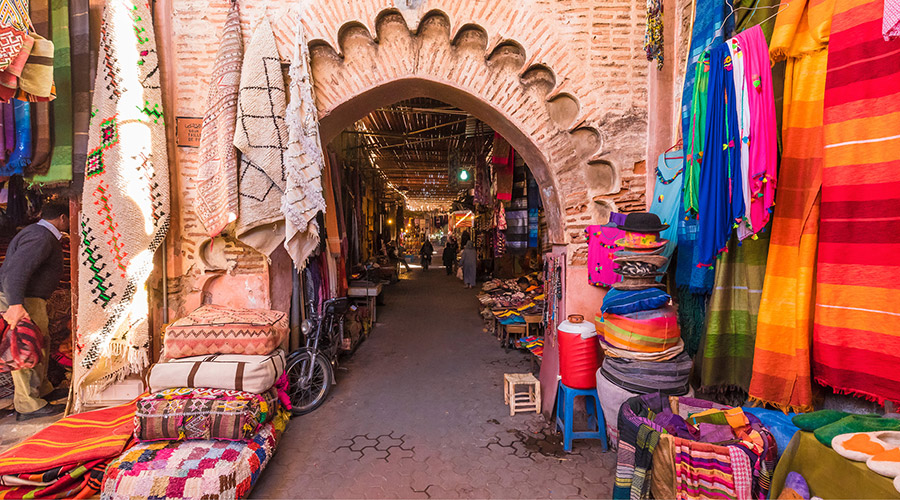
You can take the girl out of the Hallmark store, but you can’t take the Hallmark store out of the girl.
After several years helping people find the perfect card or present, I started priding myself on being an expert gift giver. The problem is, that’s a really expensive skill set when you’ve got a lot of love in your life.
The good news? In November of last year, I was headed to a destination renowned for incredible crafts and gift-able goods like spices, tea, and cosmetics. And everything I was thinking of getting ahead of time seemed pretty affordable.
Collette sent some of our staff to Morocco to get to know the destination and our tours firsthand. We left on Nov. 27, so I skipped Black Friday and saved my Christmas shopping budget for the souks.
Before you get your gift wrap and tissue paper out, unwrap my tips for a gift-giving journey to Morocco.
Tips for Shopping in Morocco
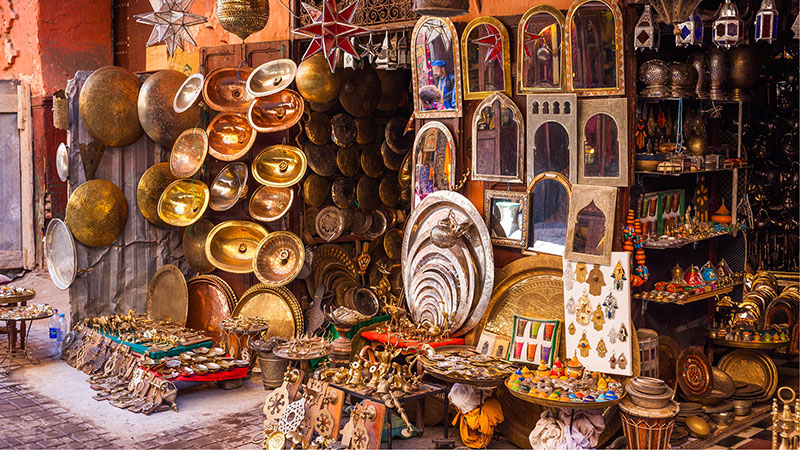
Where to Shop in Morocco
Ready to shop in Morocco, but don’t know where to begin? It helps to start your shopping quest with a list of goods you want to buy, and to know if there are cities that specialize in those items.
Some things are so deeply connected with Moroccan culture – like spices – that you’ll find quality products across the country. Argan oil, for example, is rare and indigenous to the southwest part of Morocco. But because it’s locally produced, you can find authentic culinary and cosmetic argan oil across the country cheaper than you can at home.
Then you have crafts, like iron and copper metalwork, leather goods, and weaved pieces. My personal recommendation for these pieces is to check out the souks in the Fes and Marrakech medinas.
Fes is an ancient city with a rich history of crafting. It has been home to leather tanneries for over a thousand years, and they still create and dye leather using original methods.
Fes and Marrakech are both known for skilled metalworkers. Blacksmiths can be seen creating beautiful designs on sheet metal and iron. Craftspeople hammer stunning pieces out of copper.
You’ll find weavers creating beautiful scarves and tapestries in both Fes and Marrkech, too.
Finally, I have a very niche tip for honey fans. My Tour Manager let me know that there is a honey created from cacti along the Middle Atlas Mountains. The flowers of the resin spurge cactus produce a spicy, flavorful honey that is touted for its medicinal properties.
No matter what you’re shopping for, lean on your resources! If you are concerned about quality or want tips on something specific to look out for, check in with your Tour Manager or local guide.
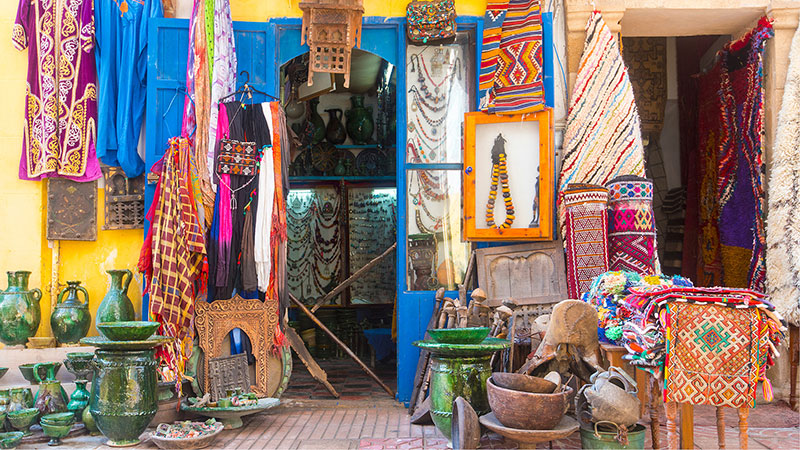
Using Money in Morocco
In my experience, cash was king when it came to shopping in Morocco.
The local currency in Morocco is the Morroccan dirham. Securing darahim is tricky because it’s a closed currency, meaning you can’t exchange for it outside of Morocco. It’s best practice to carry a smaller amount of cash, no more than you intend to spend during your trip since you must spend it there.
There are two ways to get darahim: Exchange your home currency at the airport or your hotel, or take out cash from the ATM. During my travels that were very focused on shopping, I personally did a little of all three of these methods – and they were all simple.
Whilst you can use a credit card in larger cities and at some businesses, it pays to carry cash to be on the safe side. During my trip to Morocco, I used cash almost exclusively.
I had a lot of transactions over the nine days I was exploring the country, and I only used a credit card twice: Once for lunch at a restaurant in Marrakech, and once at an indoor spice shop that was a part of my tour itinerary.
Haggling and Negotiating
Shopping in the souks is unlike a trip to shops back home. It can be very intimidating if you don’t know what to expect.
Thankfully, one of my colleagues went to Morocco a few years back and wrote an entire blog about the experience of haggling in the souks. Check it out here.
The basics, though, are as follows:
- Pricing is very flexible. Prices are very rarely set in stone and negotiation is expected.
- The original price quoted will likely be quite high. Start by offering 10-30% of the asking price.
- Don’t be afraid to walk away if you can’t come to a compromise. This may be a bargaining chip in itself, as a vendor won’t want to lose the sale.
- If you’re uncomfortable bargaining within the souks, don’t worry. There are stops in the souks included on your tour where there will be a set price that Collette has arranged ahead of time.
Keep in mind that these rules are dedicated to the souk stalls (or a taxi ride.) If you stop by a gas station, grocery store, or mall, for example, there’s no need to discuss the price or haggle.
The 6 Best Moroccan Gifts to Get for Friends and Family
1. Olive Oil - Cost: 50 dirhams, or $5 USD / bottle
Collette’s tours visit a winery in Morocco, which is fascinating on many levels. Morocco is a Muslim nation, and Islam forbids alcohol consumption. That being said, many Muslim people do drink there. This winery visit highlights a cultural taboo, and I couldn’t wait to tell people back home about it.
I know what you’re thinking: Wine is a great gift. And you’re right, but my Santa bag (I do have red luggage …) was not equipped for multiple bottles of wine.
But I still had a great option here. The vineyard also grows olives and produces olive oil that was DELICIOUS. The bottles were smaller, so I was able to bring home 3, but they were large enough that they had to go in my checked luggage.
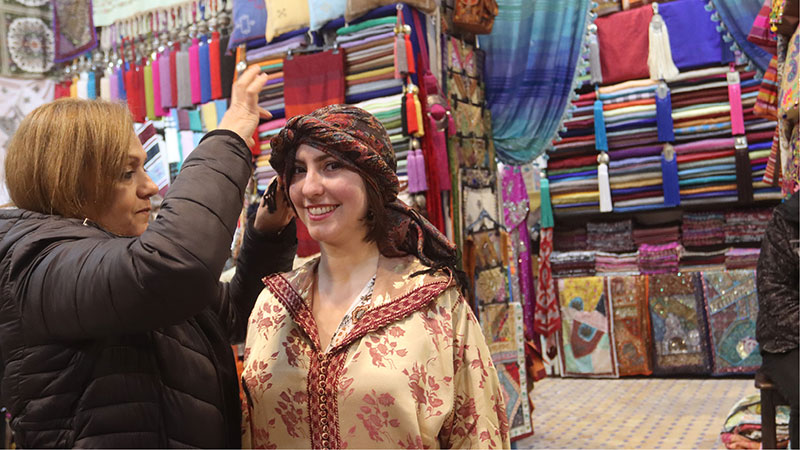
2. Scarves - Cost: 150-250 dirhams, or $15-$25 USD / per relatively basic scarf
We stopped by a weaver’s shop within the Fes medina, and I knew that this was going to be a huge shopping stop once I reviewed with my local guide.
Scarves ranged in price drastically based on material and complexity. Some of the most expensive items in the shop were made of silk weaved from agave fibers. And whilst that’s really cool, it was not in the cards for me when I planned on buying 10 or more. The most basic scarves were a little cheaper, just one colour, but I opted for some with a little extra texture and sparkle for about $5 USD more per scarf. (And my grandma got a nicer one because I am her biggest fan! Read more about my wonderful grandma, who is my favourite travel companion, in this blog.)
What was super helpful for this purchase was knowing that Collette had vetted this vendor on my behalf. I knew I wasn’t going to be quoted an unfair price or pressured into buying, which took a lot of the edge off. I knew that everything I bought that day was made in Morocco, and that extra touch mattered to me for these.
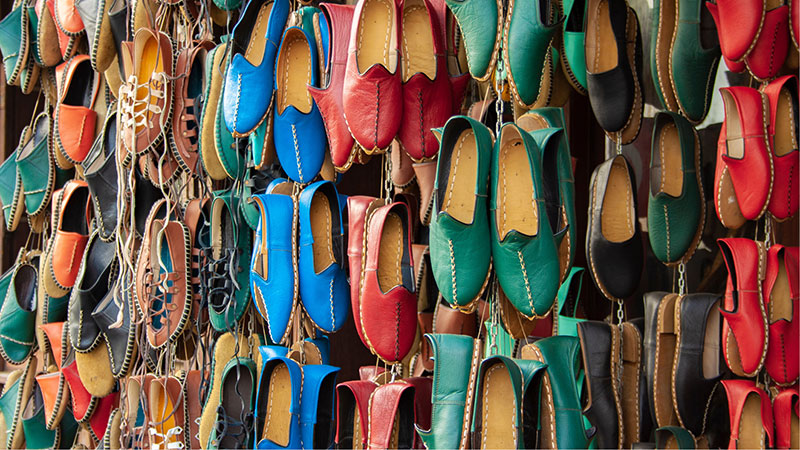
3. Handmade Leather Shoes - Cost: 150-250 dirhams, or $15-$25 / pair
On a visit to the smallest tannery in the Old Town Fes Medina, I was a little anxious nothing would be in my price range. These leathers were great quality, and were dyed using natural materials like mint, poppy flowers, saffron, and indigo.
And then I saw the walls of leather shoes. They had multiple beautiful designs, and two different shapes. The shop keeper let me know that the pointed shoes were the Arabic style, and the rounded ones were the Berber style. The Arabic style was $15 USD, and the Berber style was $25.
The hard part was letting some of them go, instead of keeping them all for myself …
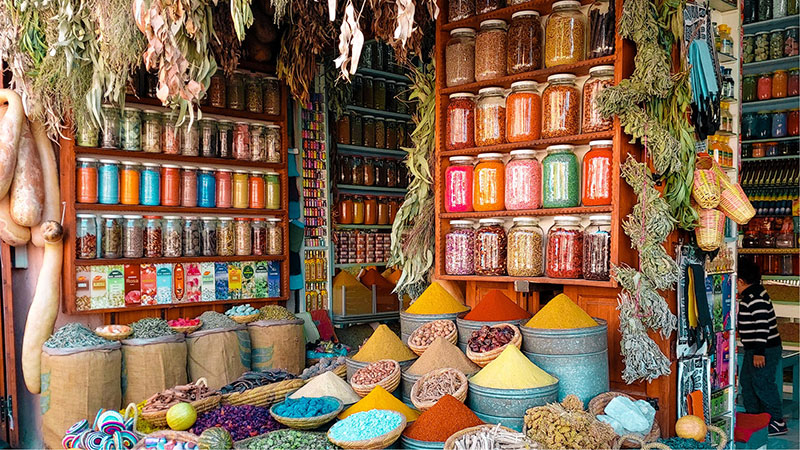
4. Dried Spices, Loose Mint Tea, and Homemade Soap - Cost: 40-50 dirhams, or $4-$5 USD each
Honestly, I was worried about finding the best quality of spices, but again, I befitted from Collette’s expertise and vetting. We stopped by a really cool spice shop where the staff explained the usage and source of spices and oils. We also got some fun commentary, like that cumin is sometimes referred to as “Moroccan Imodium.”
These are great gift for the cooking and baking lovers in your life; I got the famous spice blend ras el hanout for some folks as well as some cinnamon. We were told these spices, once opened, would last 3 years in a glass jar. Pairing these with a jar, a handwritten note, and some measuring spoons is going to make for an incredible present.
The shop also had a mint tea blend, of which I grabbed a couple bags. You’d be remiss to skip out on this for any tea fans back home. You’ll have tons of opportunities to have some tea in Morocco, so it opens the door for some travel storytelling, too!
Lastly, I grabbed a couple homemade soaps. These are a great supplemental item if you want to beef up a smaller gift.
5. Amal Centre Tote Bag - Cost: 150 dirhams, or $15 USD each.
The Amal Centre is a not-for-profit in the suburbs of Marrakech. Their mission is to support disenfranchised women and help them gain financial independence through culinary training. The centre also supported earthquake relief for those families impacted in the Atlas Mountains last year.
Travellers give back to this cause on the small group Colours of Morocco tour, but our employee visit did, too. Together, we assembled pencil cases and stuffed backpacks for children returning to school and we packed over two tons of vegetables for earthquake relief.
This training centre is well-known and respected; they’ve been a staple in their community for over a decade. This tote bag is a small token to show your support for the cause, and to share that with loved ones back home.
6. Magnets and Hats - Cost: 10-70 dirhams, or $1-$7 USD
These gifts are standard tourist fare, and you’ll see identical items in different cities, and shops; I even ended up seeing most of these magnets in the airport on my way home. Even still, these are great small tokens to let people know you were thinking of them during your travels.
Personally, I am a huge magnet fan; I think my fridge is going to fall forward from the sheer weight of all of them soon.
Pricing on these is where haggling will really come into play. I found depending on where you were, magnets were $1 - $3.
And I grabbed my dad a hat for $7. Could I have gotten it for less? Maybe, but I really wasn’t mad about a $7 hat and by the end of my travels, I was developing real haggling fatigue.
Bonus: Freebies - Cost: Priceless
Tea and honey are always a good gift, and for these, the price was right! I brought home a couple of tea bags and little single serve jars of honey from some of the hotels we stayed in.
Pairing a few of these with a mug will make a great present. I also always pack my own travel shampoos and soaps, so if you find your accommodation has some cool local soaps, you can bring those home to help make a little spa kit. I stayed at one property that had bars of soap with argan oil and orange blossom, as an example, and I ended up sharing these with my mother.
Final Moroccan Shopping Tips
Remember, gift givers:
- I shared the prices I paid, but they will vary. Don’t be afraid to haggle!
- I shopped for a lot of people! Keeping a tighter budget in mind, that also means that some no brainer buys when in Morocco like saffron and argan oil didn’t make my personal shopping list.
- Pro tip: If you’re planning a gift-heavy trip, pack light!
Happy travels, happy shopping, and happy gifting!

